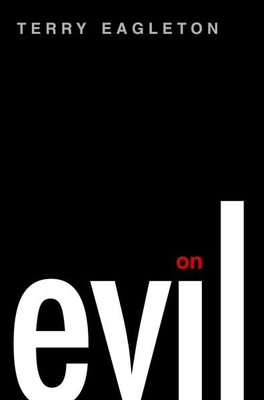 On Evil by Terry Eagleton (Yale University Press)
On Evil by Terry Eagleton (Yale University Press)
Terry Eagleton brings news: he tells us that there really is such a thing as evil. He feels that it is necessary to tell us this because contemporary liberals and leftists regard talk of evil as merely a way of describing extreme forms of moral badness – and that, he argues, misses a point. I think he is wrong about this; liberals and leftists would delete the “merely” in the foregoing sentence because in capturing the extreme character of the badness in question the word “evil” does an important job. They would therefore have no reason to deny that evil exists, not in some metaphysical sense but in the plain sense that there are people and acts that unequivocally exemplify it – people who in extreme ways are deliberately malicious, cruel and destructive, and acts that are horrible, brutal and morally revolting. How could anyone deny this given that, alas, history and the contemporary world stagger under the evidence?
Eagleton – in the process always witty, always fluttering a diaphanous veil of ambiguity over his stylish prose – alleges the insufficiency of this view. He does not go so far as to say that evil is some sort of metaphysical stuff, but he implies that it is more like that than a “mere” egregious degree of badness. And he thinks it matters to say so because what he takes to be the liberals’ down-playing of evil renders them, he says, impotent to deal with it.
Accordingly he sets off on one of those complexifying journeys, like the route of a pinball bouncing backwards and forwards among a thicket of pingers, from William Golding to St Augustine, Macbeth to Pseudo-Dionysus, original sin to the Holocaust, Shakespeare to Freud, Satan to Thomas Mann, Arendt to Aristotle, and so copiously on – a verbal pinball ride among the entries in the telephone book of Western culture, to tell us what evil is. But do not expect, by the end, a conclusion, still less a definition, nor even a summary. Eagleton has been too long among the theorists to risk a straightforward statement. You have to grasp at fragments as you bounce among the pingers, not always quite sure whether he is agreeing or disagreeing with this or that author, even whether he is still paraphrasing an author or speaking with his own voice. That’s a technique, of course.
Anyway: as one falls down the hole at the end of the ride one has somehow gathered the following: evil is “a condition of being”. What condition is that? Perhaps examples will help. Were the Nazis evil? Eagleton says only Hitler himself was “authentically so”. Was the 9/11 attack on the Twin Towers evil? No, apparently; it was wicked but explicable, and anyway the Americans have killed far more people in pursuit of imposing their Way on the world than the 9/11 hijackers did. There is nothing rational about evil; those who perpetrate it are not amenable to argument.
So, these two pings tell us that evil is a non-rational “condition of being”. Further pings tell us, however, that it is a kind of non-being too; it relates to nothingness, annihilation and death. Accordingly, evil acts are those that destroy. But, on the other hand, they also create; they create meaninglessness. Freud’s death drive, Schopenhauer’s gloom, the despair of the alcoholic, all help to show why it is a modern mistake, says Eagleton, to think that evil is glamorous (who thinks this?) when actually it is monotonous and banal. (Oh? Most people think it is frightening.) So though we do not bump into evil every day, it is connected to the ordinary; “the death drive is nothing special, and there is no shortage of sadists.” But on the other hand we should “not overestimate how pervasive it is.” Wickedness is much more common than evil. Evil, therefore, “is not something we should lose too much sleep over.”
As we are dealing with Eagleton here, note that this is of course not a mish-mash of inconsistencies, as it appears to be; this is subtlety and nuance. It is, you might say, nuance-sense.
I recommend a comparison with Marcus Singer’s essay “The Concept of Evil” in the journal Philosophy (2004), the bibliography to which shows how little homework Eagleton has done on the subject’s literature. Singer demonstrates that what Eagleton dismisses as the “liberal” view, as above, is not only straightforward but robust. Eagleton’s literary resources and passing references to the Holocaust pale in comparison to the excoriating examples of horrible behaviour some people are capable of, graphically reported by Singer to illustrate, by evoking it in us, the depth of moral revulsion that makes “evil” the appropriate choice of adjective to describe such people and acts. It is a serious word for a serious subject; it expresses the furthest condemnatory reaches of our calibration of moral quality.
Singer’s concentration on the malevolence of evil – the presence of a conscious intention to do terrible harm – needs to be supplemented by the thought that wicked things can be done by people supposing themselves to be serving a good end – Nazis saw racial hygiene where their opponents saw mass murder. But even here intention enters; those Nazis recognised that to realise their aim they had to do cruel and destructive things – and not a few of them did those things with relish.
True, people sometimes use “evil” hyperbolically, as a vent for shocked responses; that is understandable but inaccurate, and anyway a pointer to its focal use to mark what goes beyond the limits of moral conceivability. This is the central feature of the notion.
It is scarcely news that evil, in this sense, exists. Eagleton’s excursions into literary hermeneutics and such theological absurdities as original sin are entertaining, but add nothing – rather the opposite – to our understanding of what we mean by evil, a feature of our world which is alas all too clear already.
The notion that evil is non-rational is a more significant claim for Eagleton than at first appears, because he is (in this book as in others of his recent “late period” prolific burst) anxious to rewrite theology: God (whom he elsewhere tells us is nonexistent, but this is no barrier to his being lots of other things for Eagleton too, among them Important) is not to be regarded as rational: with reference to the Book of Job Eagleton says, “To ask after God’s reasons for allowing evil, so [some theologians] claim, is to imagine him as some kind of rational or moral being, which is the last thing he is.” This is priceless: with one bound God is free of responsibility for “natural evil” – childhood cancers, tsunamis that kill tens of thousands – and for moral evil also even though “he” is CEO of the company that purposely manufactured its perpetrators; and “he” is incidentally exculpated from blame for the hideous treatment meted out to Job.
You can see where this leads: with other ways of defining deity conveniently beyond any possible meaning that can be attached to the notion, the religionists and their fellow-travellers are forever protected from challenge to and criticism and refutation of religious ideas and beliefs.
Eagleton has spent his life inside two mental boxes, Catholicism and Marxism, of both of which he is a severe internal critic – that is, he frequently kicks and scratches at the inside of the boxes, but does not leave them. Neither are ideologies that loosen their grip easily, and people who need the security of adherence to a big dominating ideology, however much they kick and scratch but without daring to leave go, hold on to it every bit as tightly as it holds onto them. The result is of course strangulation, but alas not mutual strangulation: the ideology always wins.
No one not brought up a Catholic or a Calvinist would even remember the concept of Original Sin, let alone bring it into a discussion of evil. But Eagleton does, and at length. For those not subjugated to the outlook only within whose terms can the doctrine appear to make any sense, Original Sin seems a doozy of an idea. Compare: a pharmaceutical company tells us that we are all born with a disease that requires that we buy their product all our lives long, and that if we do it will cure us after death. This reminds me of the joke about Bernie Madoff, that his big mistake was promising returns in this life; he should have taken his cue from the religions.
Because the distal springs of Eagleton’s views include Catholic doctrine, it is interesting to note what a source of impeccable authority on that head has to say about evil: the Catholic Encyclopaedia. It is only mildly surprising that this tome’s entry on evil contains no reference to the devil, Satan or Lucifer. In defining evil as “what ought not to exist,” and as the sum of opposition to the desires and needs of individuals, resulting from the action of “created free will”, it provides a coolly dispassionate and downbeat account not only of Christian but of other philosophical views, from Heraclitus to Zoroaster. The one thinker among them whose view most resonates with the contemporary (liberal, leftist, non-metaphysical, Singer-type) connotation of the word “evil” is Empedocles, who said that evil is an expression of hate (neikos), thus placing at the centre of attention a crucial assumption and a crucial implication: the assumption that evil is focally a property of agents and their actions (so “evil” as applied to diseases and natural disasters is a metaphor), and the implication that it is deliberate: deliberately malicious, intentionally cruel and destructive, malevolent (in the strict literal acceptation of this term: “ill-wishing”). And finally: that evil is these things to an extreme degree.
It happens that Terry Eagleton’s view is effectively not a lot different from this – how could it be, sensibly? – once one strips away the irrelevancies about original sin, the entertaining but in the end equally irrelevant discussion of death and hell in Golding and others, the rewritings of theology, and the partial defence of Islamic terrorism. This might not seem evident at first sight among the inconsistencies-or-nuances of his view; but it is so.
This is the extended remix of the review that appears in New Humanist May/June 2010

